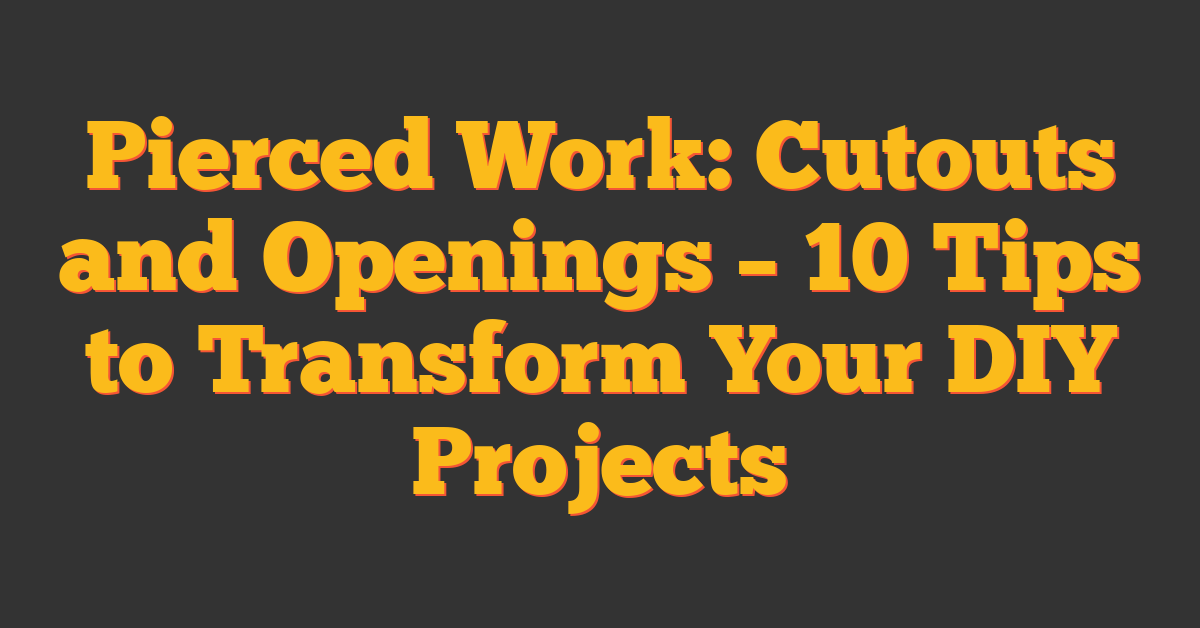Woodworking isn’t just about crafting beautiful pieces—it’s a journey that can soothe your mind and nurture your well-being. When you engage with wood, every cut and carve becomes a form of meditation, allowing you to focus and find peace amidst the chaos of daily life. The rhythmic sounds and tactile engagement provide a comforting escape, making each project a step toward mental clarity.
By immersing yourself in this hands-on activity, you tap into a creative flow that reduces stress and enhances your sense of accomplishment. Whether you’re a seasoned woodworker or just starting out, discovering the therapeutic benefits of woodworking can transform your leisure time into a fulfilling and healing experience.
Mental Health Benefits
Engaging in woodworking enhances your mental well-being through various mechanisms. It offers structured activities that contribute to a healthier mind.
Stress Reduction
Woodworking lowers cortisol levels, the hormone associated with stress. Immersing yourself in creating projects diverts your attention from daily worries, promoting relaxation. The repetitive motions and focus required during tasks like sanding or assembling pieces foster a sense of calm. Additionally, completing a project provides a tangible sense of achievement, further alleviating stress.
Improved Focus
Woodworking sharpens your concentration by demanding sustained attention to detail. Working on intricate designs or precise measurements enhances your ability to maintain focus over extended periods. This practice translates to improved cognitive functions in other areas of your life. Moreover, setting and following through on project goals strengthens your organizational skills, contributing to better overall mental clarity.
Physical Health Benefits
Engaging in woodworking enhances your physical well-being through various activities that strengthen your body. These benefits contribute to a healthier and more active lifestyle.
Fine Motor Skills
Woodworking refines your fine motor skills by requiring precise hand movements. Handling tools like chisels and saws improves dexterity and coordination. Measuring and cutting wood with accuracy sharpens your hand-eye coordination, essential for intricate projects. Additionally, assembling pieces develops your manual precision, enabling you to execute detailed craftsmanship effectively.
Physical Activity
Woodworking offers substantial physical activity that promotes overall fitness. Lifting and moving lumber builds muscle strength, particularly in your arms and back. Sanding and finishing projects engage your shoulders and wrists, enhancing endurance and flexibility. Regular woodworking sessions contribute to better posture and reduced risk of repetitive strain injuries, supporting a more active and healthy lifestyle.
Creative Expression
Woodworking lets your creativity shine. Designing custom projects helps you envision unique furniture that matches your style. Choosing different woods, stains, and finishes lets you experiment with colors and textures, making each piece one-of-a-kind. Crafting items tailored to your needs builds a sense of ownership and pride in your work. Solving design challenges boosts your problem-solving skills and encourages innovative thinking. Through woodworking, you transform raw materials into meaningful objects, channeling your ideas and emotions into tangible forms.
Mindfulness and Focus
Engaging in woodworking cultivates mindfulness by immersing you in the present moment. Each cut, sand, and assembly requires your full attention, reducing distractions from daily stressors. This deep focus enhances your ability to concentrate, allowing you to block out external noise and internal chatter.
Enhancing Concentration
Woodworking demands sustained attention to detail. Measuring twice and cutting once ensures precision, which sharpens your concentration skills. By regularly practicing these tasks, you improve your capacity to maintain focus in other areas of your life.
Reducing Mental Clutter
The structured nature of woodworking projects helps organize your thoughts. Planning each step and visualizing the end product clears mental clutter, fostering a sense of clarity. This mental organization translates to better problem-solving and decision-making abilities.
Promoting Relaxation
The repetitive motions involved in woodworking, such as sanding or carving, induce a meditative state. This rhythmic activity lowers anxiety levels and promotes relaxation. Incorporating these practices into your routine can lead to increased emotional stability and resilience.
Building Emotional Resilience
Completing woodworking projects provides a tangible sense of accomplishment. Each finished piece reinforces your ability to set and achieve goals, boosting self-esteem and confidence. This positive reinforcement enhances your emotional resilience, helping you navigate challenges more effectively.
Improving Cognitive Function
Woodworking stimulates various cognitive functions, including spatial awareness and hand-eye coordination. Planning projects and solving design challenges engage your brain, enhancing memory and cognitive flexibility. Regular engagement in these activities supports long-term brain health.
Creating a Flow State
Achieving a flow state during woodworking leads to heightened productivity and satisfaction. When you’re fully absorbed in crafting, time seems to disappear, and you experience a deep sense of fulfillment. This immersive experience contributes to overall mental well-being and happiness.
Structured Creativity
Balancing creativity with structure in woodworking projects helps you maintain focus. Designing unique pieces requires imaginative thinking within defined parameters, fostering both creative and analytical skills. This balance enhances your ability to innovate while staying organized.
Practical Application
Implementing mindfulness practices through woodworking can transform your mental landscape. Set aside dedicated time in your garage shop to work on projects without distractions. Use each task as an opportunity to practice focused attention and mindfulness, integrating these benefits into your daily life.
Benefits at a Glance
| Aspect | Benefit |
|---|---|
| Concentration | Enhanced focus and attention |
| Mental Clutter | Improved clarity and organization |
| Relaxation | Reduced anxiety and increased calm |
| Emotional Resilience | Boosted self-esteem and confidence |
| Cognitive Function | Sharper memory and spatial awareness |
| Flow State | Increased productivity and satisfaction |
| Structured Creativity | Balanced creative and analytical skills |
Social Benefits
Engaging in woodworking fosters meaningful connections and a sense of belonging.
Community and Support
Join local woodworking clubs or online forums to share your projects and gain valuable feedback. Connecting with fellow enthusiasts provides encouragement, inspiration, and the opportunity to learn new techniques. Participating in group workshops or collaborative projects strengthens your skills and builds lasting friendships. Whether you seek advice on finishing or want to showcase your latest creation, the woodworking community offers a supportive environment to grow and thrive.
Getting Started
Embarking on your woodworking journey sets the foundation for a rewarding experience. Follow these steps to equip your workshop and select projects that suit your skills.
Tools and Materials
Equip your workshop with essential tools to start woodworking effectively:
- Basic Tools: Hammer, screwdrivers, measuring tape, and a reliable saw provide versatility for various tasks.
- Power Tools: Invest in a power drill, circular saw, and sander to enhance efficiency and precision.
- Safety Gear: Safety glasses, ear protection, and gloves ensure protection during projects.
- Materials: Select quality lumber, plywood, and finishing supplies like stains and varnishes for durable results.
Maintaining your tools and stocking appropriate materials streamlines your workflow and ensures project success.
Choosing Projects
Select projects that match your skill level and interests to maximize enjoyment and growth:
- Beginner Projects: Start with simple items like cutting boards or shelves to build foundational skills.
- Intermediate Projects: Progress to furniture pieces such as benches or side tables that require more precision and planning.
- Advanced Projects: Tackle complex designs like dining tables or cabinetry that challenge your craftsmanship and creativity.
Choosing projects that align with your abilities fosters continual improvement and keeps woodworking engaging.
Conclusion
Woodworking offers a unique blend of creativity and calm that can transform your daily life. Whether you’re shaping a simple cutting board or crafting a piece of furniture you’ll cherish the process itself becomes a therapeutic escape.
As you engage with the materials and tools you’ll find a sense of accomplishment and peace that few other activities provide. The skills you develop go beyond woodworking enhancing your focus and boosting your mental clarity.
Joining a community of fellow woodworkers can deepen your experience providing support and inspiration along the way. Embrace the journey and discover how woodworking can become a meaningful part of your well-being.
Frequently Asked Questions
What are the mental health benefits of woodworking?
Woodworking promotes mental well-being by acting as a meditative practice. It helps reduce stress by lowering cortisol levels and providing a calming escape from daily pressures. Engaging in woodworking enhances concentration, sharpens cognitive functions, and offers a sense of accomplishment upon completing projects. This creative process fosters emotional resilience and boosts self-esteem, contributing to overall mental health.
How does woodworking help reduce stress?
Woodworking reduces stress by diverting attention from daily worries and promoting relaxation through repetitive motions. The tactile nature and rhythmic sounds of working with wood create a soothing environment. Completing projects provides a tangible sense of achievement, which alleviates stress and enhances feelings of satisfaction and well-being.
Can woodworking improve cognitive functions?
Yes, woodworking enhances cognitive functions by demanding sustained attention to detail and fostering problem-solving skills. Planning and executing projects improve spatial awareness, memory, and organizational skills. The creative process stimulates the brain, supporting long-term brain health and cognitive clarity.
What physical health benefits does woodworking offer?
Woodworking enhances physical health by improving fine motor skills, dexterity, and coordination through precise hand movements. Activities like lifting lumber and sanding promote muscle strength and endurance, contributing to better posture and reducing the risk of injuries. Regular woodworking supports a more active and healthier lifestyle.
How does woodworking promote creativity?
Woodworking allows individuals to design custom projects that reflect their personal style. Experimenting with different woods, stains, and finishes fosters creative expression. Solving design challenges encourages innovative thinking, enabling woodworkers to transform raw materials into unique and meaningful objects.
Is woodworking a good way to practice mindfulness?
Yes, woodworking is an excellent practice for mindfulness. Each task requires full attention, reducing distractions and enhancing focus. The structured nature of projects helps organize thoughts, while repetitive motions promote relaxation. This mindful engagement leads to improved clarity, emotional resilience, and overall mental well-being.
Can woodworking help me connect with others?
Absolutely. Woodworking fosters social connections through local clubs, online forums, and group workshops. Sharing projects and exchanging feedback with fellow enthusiasts builds a sense of community and belonging. Collaborative projects and community support provide encouragement, inspiration, and opportunities to form lasting friendships.
What tools do I need to start woodworking?
Starting woodworking requires basic tools such as hammers, saws, and measuring tapes. Power tools like drills and sanders enhance efficiency and precision. Safety gear, including goggles and gloves, is essential for protection. As you progress, you can invest in more specialized tools to accommodate various projects and skill levels.
What projects are suitable for beginner woodworkers?
Beginner woodworkers should start with simple projects like cutting boards, picture frames, or small shelves. These projects help build fundamental skills and gain confidence. As you become more comfortable, you can gradually move to more complex items like furniture pieces, ensuring continual improvement and enjoyment in the craft.
How does woodworking enhance concentration and focus?
Woodworking enhances concentration by requiring sustained attention to detail and precise execution of tasks. The need to plan, measure, and assemble parts cultivates focus and minimizes distractions. This deep engagement helps improve overall concentration skills, which can benefit other areas of life.




